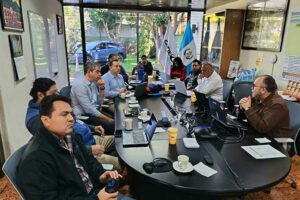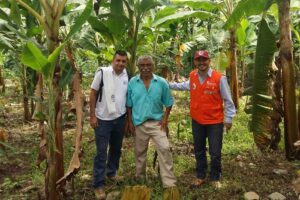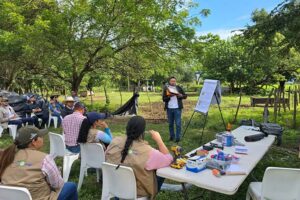CATIE contributes to knowledge on plastic consumption in Costa Rican households and the economic impact of its inadequate management

- The studies highlight the need to improve plastic waste management in Costa Rica and prevent its generation at the source.
CATIE (Tropical Agricultural Research and Higher Education Center), in collaboration with the United Nations Development Programme (UNDP) and with financing from the French Global Environment Facility (FFEM), presented two new publications that provide evidence on the use of plastic in the daily lives of Costa Rican households and on the economic costs of its inadequate management.
These studies are part of UNDP’s Consumo 180° project, whose results aim to strengthen public decision-making and guide the implementation of evidence-based solutions to address plastic pollution in the country. The core research team responsible for the studies includes Róger Madrigal, Pablo Evia and Daniela Rivera, members of CATIE’s Environmental Economics and Sustainable Agribusiness Unit (UEAAS/EfD.
The first study, titled “Plastic content in the consumption basket in Costa Rica,” reveals that an average family produces 751 grams of plastic waste per month solely from the consumption of food, non-alcoholic beverages and personal hygiene products. At the national scale, this amounts to more than 13,900 tons of plastic waste per year.
Pablo Evia stated: “It is essential to quantify this consumption by product and by type of plastic to identify the most relevant cases and propose viable alternatives. This is especially important because many types of plastic are not easily recyclable, which reduces recovery possibilities. In the national context, a significant proportion of this waste goes unmanaged, generating avoidable environmental and economic impacts.”
The second study, “Negative externalities from inadequate plastic waste management in Costa Rica,” quantifies for the first time the economic losses generated by plastic pollution in several sectors, as well as in river and beach cleanup activities.
For example, the fishing sector could face losses ranging between 12.6 and 126.7 million dollars between 2023 and 2050 due to the accumulation of waste in marine ecosystems and its impact on commercially important species. The effects extend further, as greenhouse gas emissions generated throughout the plastic life cycle could represent costs ranging from 172.3 to 613.4 million dollars over the same period; meanwhile, the accumulation of waste in hydroelectric reservoirs could affect turbine efficiency and generate up to one million dollars in additional operating costs between 2023 and 2050.
“These results emphasize the urgency of strengthening collective action and advancing toward more ambitious public policies aimed at driving meaningful transformations in plastic consumption and production patterns, in addition to improving comprehensive waste management infrastructure,” commented Madrigal, coordinator of CATIE’s UEAAS/EfD.EfD, researcher at CATIE.
As part of the dissemination of these findings, members of CATIE’s research team participated in episode 7 of UNDP Costa Rica’s podcast “Pláticas de Plástico,” where they discussed the study’s results in depth and the need to reflect on the “invisible” cost of plastic—one that is not paid by those who produce and consume it, but rather falls on coastal communities, municipalities, productive sectors and public health.
Through these studies, CATIE seeks to generate evidence that informs more effective policies for sustainable development and strengthens cooperation among institutions, the private sector and citizens.
“For many countries in the region, these findings offer key lessons: solutions begin with understanding the origin, quantity, type and impacts of plastic waste in strategic economic sectors. In a context of growing challenges, this evidence is essential to reveal the true cost associated with plastic use and the strategies that can be implemented to minimize it,” concluded Madrigal.
Find the publications and the podcast here:
- Plastic content in the consumption basket in Costa Rica: https://pnud-conocimiento.cr/repositorio/contenido-de-plastico-en-la-canasta-de-consumo-en-costa-rica/
- Negative externalities from inadequate plastic waste management in Costa Rica: https://pnud-conocimiento.cr/repositorio/externalidades-negativas-por-la-inadecuada-gestion-de-los-residuos-plasticos-en-costa-rica/
- Episode 7 of the podcast “Pláticas de Plástico”: https://open.spotify.com/episode/50jDZ0iQlusgNmkZcR7XwJ?si=GfkaIuXGQ761ZAy6JEmN1A
More information:
Pablo Evia Salas
Researcher
Environmental Economics and Sustainable Agribusiness Unit (UEAAS/EfD)
CATIE
pablo.evia@catie.ac.cr
Written by::
Daniela Rivera Villalobos
Research Assistant
Environmental Economics and Sustainable Agribusiness Unit (UEAAS/EfD)
CATIE
daniela.rivera@catie.ac.cr



